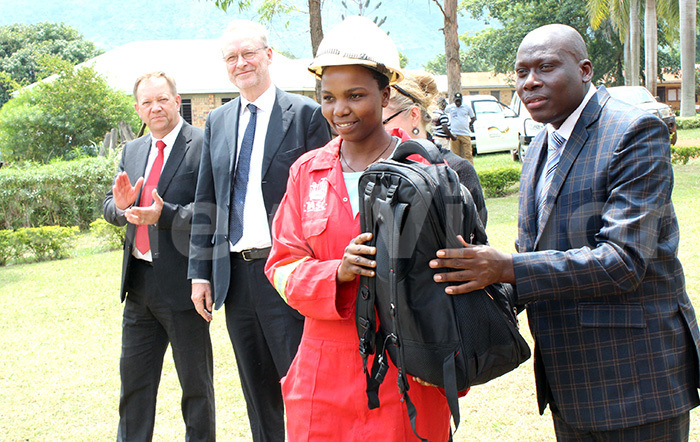Shortage of skills might affect local participation in oil industry
Aug 27, 2018
Uganda needs over 25,000 qualified workers, craftsmen and technicians to exploit oil and precious minerals

Green (left); Christian Schnurre, the country director GIZ (second-left); look on as Joseline Nyangoma, one of the students; receives a certificate from John Steven Ekoom, the Hoima resident district commissioner. (Credit: John Odyek)
The shortage of skilled Ugandans is likely to limit Ugandans from enjoying the fruits from the production phase of the oil and gas industry.
Honey Malinga, the director of the Directorate of Petroleum, Ministry of Energy and Mineral Development, while addressing graduates of the Youth Employment Enhancement Project (YEEP), said the industry experiences many challenges towards local content development.
He was speaking during the graduation ceremony of 220 artisans who received international certification in welding, fabrication and pipework, electrical engineering, scaffolding erection and inspection.
The YEEP Project is one of the projects implemented by GIZ under E4D/SOGA (Employment and Skills for Eastern Africa) a Programme funded by the UK Department for International Development (DFID), the German Federal Ministry for Economic Cooperation and Development (BMZ), the Norwegian Agency for Development Cooperation (NORAD) and Shell.
The Programme works in partnership with The Ministry of Energy and Mineral Development and in close co-operation with the Ministry of Education and Sports.
The function took place on Thursday at St Simon Peters Vocational Training Centre, Hoima.
"Shortage of skilled workforce, lack of data on existing skills and how these relate to the current demand in the sector, lack of communication on the details of jobs available in the industry and the required qualifications stagnates the sector. Through the Petroleum Authority of Uganda, the National Talent Register is being developed," Malinga said.
Uganda needs over 25,000 qualified workers, craftsmen and technicians to exploit oil and precious minerals that have been discovered over the last 10 years that can enable Uganda achieve the lower middle income status.
Malinga said the oil and gas industry alone where $20b will be invested over the next three years, 16,000 jobs will be created during peak production. He said 75% of these jobs will require people with vocational and technical skills.
Fr Joseph Bigirwa, the director of St Simon Peters Vocational Training Centre, said the training has propelled the institution upwards to provide internationally recognised qualifications.
Bigirwa encouraged the graduates to pursue self-development relentlessly as a multi-dimensional concept encompassing spoken languages, mental perseverance, events organisation skills and physical elements. Strive to develop to international standards. Acquire new forms of knowledge and move society for the indefinite future," Bigirwa said.
Patrick Mbonye, the managing director of Q - Sourcing/ The Assessment and Skilling Centre (TASC) urged graduates to be diligent in their work.
"Your work involves your body, mind and heart. Your heart is more important in the work. What you will produce will be used by others and so you will use your heart in your work," Mbonye said.
Adrian Green, head of growth and economic management at DFID Uganda, British High Commission Kampala, said the graduates had suffered the pain required to complete the training.
"The rewards from the training will come. Stay determined. You will unlock the oil industry. The oil development is necessary for Uganda. Many young people are entering the labour market so industrial development is necessary for employment," Green said.
He explained that the UK is investing in development of support which includes various projects to assist Uganda in this process.
"The UK has committed £260m (sh1.2trillion) to the development of an international economic growth airport project at Kabaale, and is working to ensure it impacts all sectors - oil and gas, agriculture - tourism - domestic and international travel and trade".

PIC: Green (left), Christian Schnurre (second-left), look on as Immaculate Ngonzibwa receives a bag containing personal protective Equipment (PPE) from John Steven Ekoom, the Hoima resident district commissioner
Julia Kronberg, head of development Co-operation at the German Embassy, encouraged the graduates to use their skills to provide food for their families and seek investments in poultry, piggery and farming.
"The training certificate should be a seed for your future. Women who have been trained can start business. Employment creation and food security are the cornerstone of Germany's co-operation with Uganda," Kronberg said.
The Permanent Secretary of Education and Sports, through a speech read by the Commissioner Business, Technical, Vocational Education and Training (BTVET) Hajjat Safinah Musene, thanked the donors for supporting the preparation of young Ugandans with the skills necessary to get jobs in the highly demanding sectors such as oil and gas. Musene pledged the Ministry's support to these initiatives and called for closer collaboration.
The prime minister of Bunyoro Kitara Kingdom, Andrew Kirungi Byakutaga, represented by Robert Rukahemura, special aide in Prime Minister's Office, used the occasion to ask the Bunyoro men not to beat their wives.
Byakutaga asked men to plan for development with their wives. He urged the graduates to be aware of HIV/AID. The Employment and Skills for Eastern Africa Programme (E4D/SOGCA) trained the artisans under YEEP. The training was carried out in partnership with the ministry of energy and mineral development together with the ministry of education and sports.
